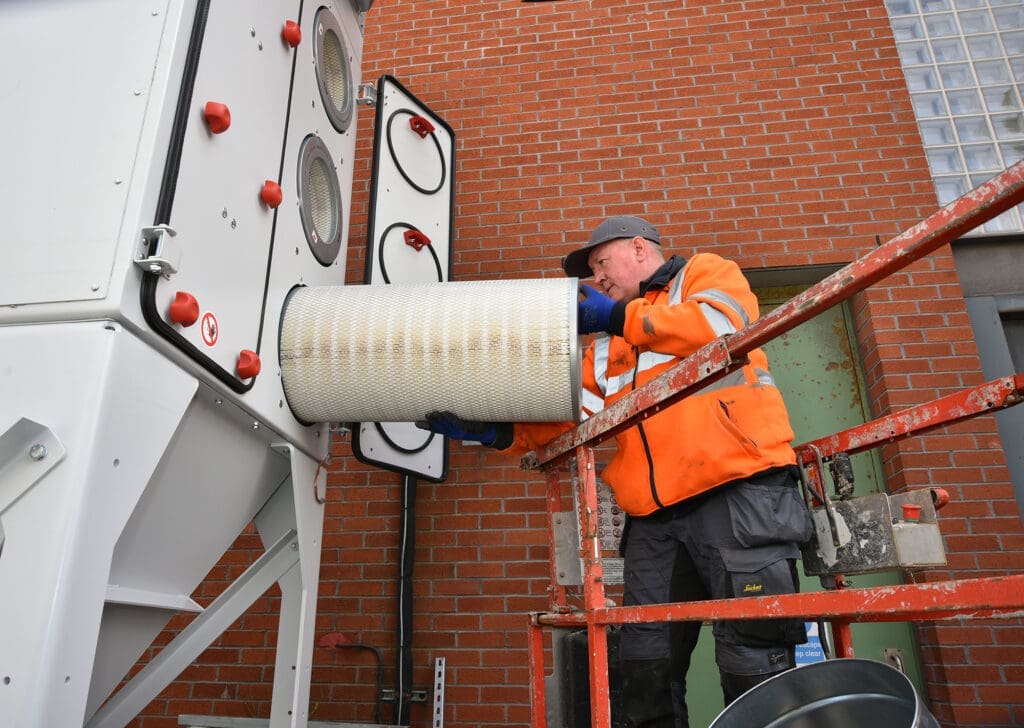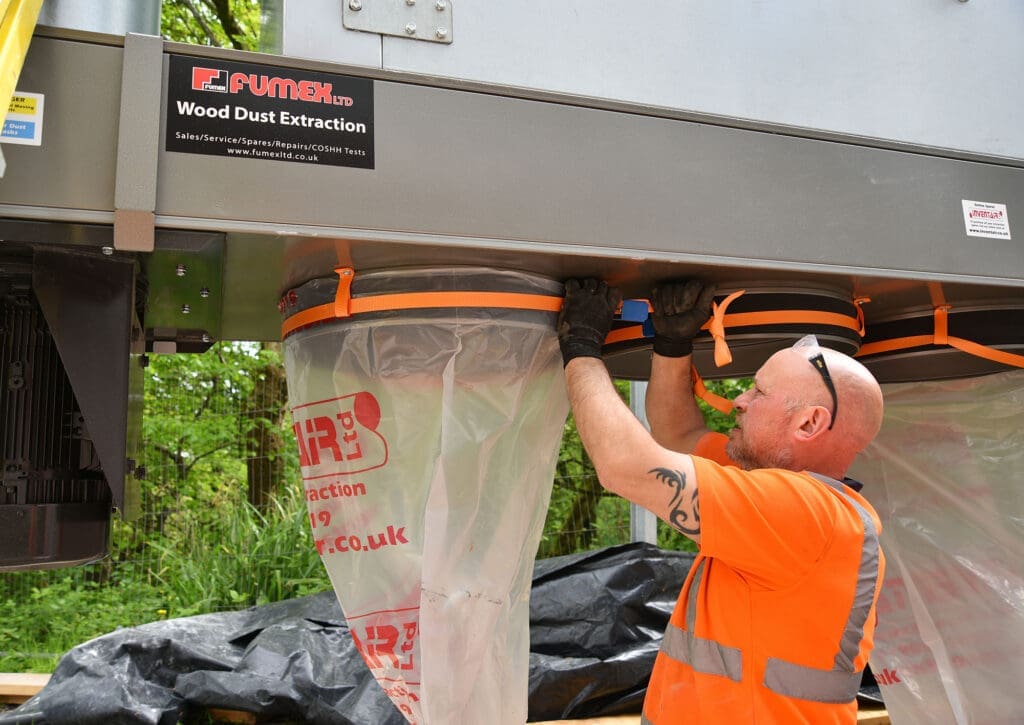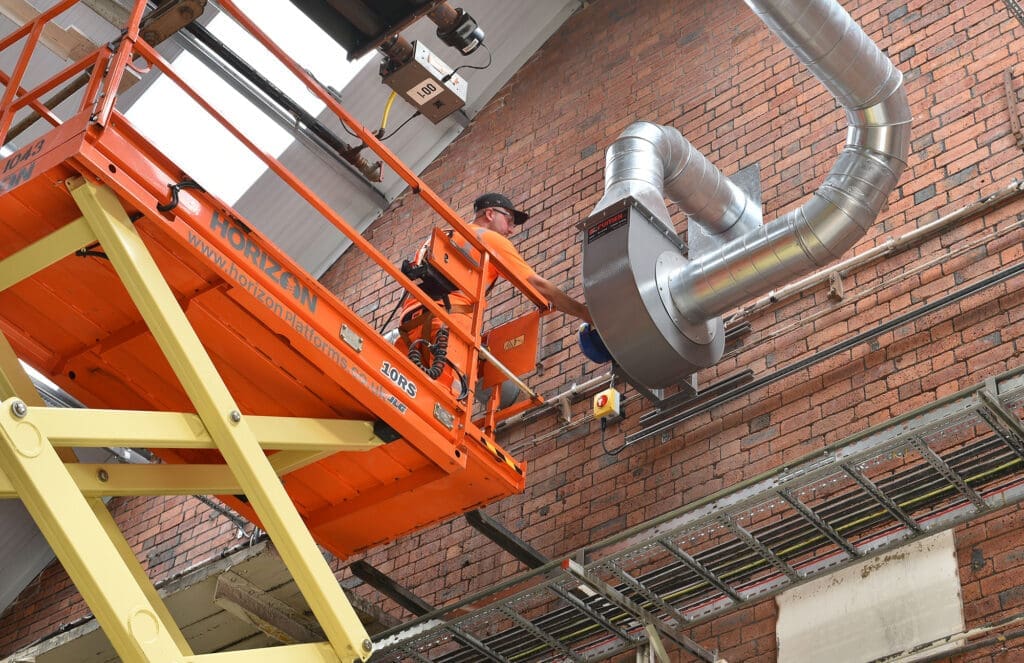
Do you ever give any thought to the servicing of your extraction system?
Pause for a moment and consider your workplace operations.
Despite an extraction system being in use, do your employees still have to wear dust masks throughout their shift?
Or is the area around the work equipment dusty and dirty?
Take a look outside the production unit.
Is it dusty out there too?
If you answered yes to any of these questions, you probably need to service your extraction system.
Modern machinery may well have a GUI or HMI that will tell you when it is due a service.
Older, more basic, or simpler machinery may not have this functionality – so it’s important to know what the signs of an unhappy extraction system are.
Thankfully most issues can be easily rectified through a thorough service.
Give-away signs that your extraction system needs some attention are:
These signs can be indicative of deficient motors, clogged filters, blocked or damaged ducting, or leaking containers.
It’s a good idea to inspect the extraction system as soon as you notice these issues and arrange a follow up service if you aren’t able to identify or rectify the problem.

You shouldn’t restrict your extraction system servicing to times when it is no longer performing optimally.
A routine annual service should form part of your preventative maintenance regime and will ensure service life as well as health of your employees.
As we’ve touched upon throughout this article, there are a number of benefits to servicing your extraction system.
Your extraction system was designed very carefully to ensure that it removes all of the harmful contaminants produced during your operational processes.
Factors such as the fan motor power, duct diameter and length affect air velocity, and suction power, and will have been carefully calculated based on the system working efficiently and optimally, by being kept in good, functional condition.
Regular servicing of your extraction system gives you the confidence that it is in peak condition and running optimally.
Servicing your extraction system will keep your employees safe by minimising, or even eliminating their exposure to the dust, vapour, fumes, or other contaminants arising from your work processes.
This in turn will increase employee productivity as they won’t be distracted or made uncomfortable by being exposed to the production residues.
Long term this will also prevent sickness absence, reduce employee turnover (would you stay in a job which exposed you to harm?) and improve employee morale.
Operational efficiencies aside, there is another very good and important reason why you should service your extraction system: legal compliance.
Under the 1974 Act, there are a number of statutes that place responsibility upon employees to properly maintain work equipment:
Regular servicing of your extraction system will ensure legal compliance should you be scrutinised by the HSE, and also support your defence should you be involved in court proceedings regarding exposing employees, and non-employees, to harmful substances.
An extraction system service includes extensive inspection, in order to identify worn or damaged components as well as assess the overall extraction capabilities of the system.
Doing this will ensure problems are found and rectified before they become larger issues, which can cost more to put right.
Don’t forget that the costs associated with the repair are not limited to the parts; factor in the loss of productivity during machine downtime, as well as potential loss of sales, and you suddenly have a costly repair which could have easily been avoided.
Some production processes rely on debris being properly extracted from the workpiece in order to maintain finish quality.
Shot-blasted timber is a prime example, where metal deposits left on the timber surface are unsightly and hinder treatment fluid uptake.
Similarly, metal swarf and filings left on the workpiece may diminish the ability to achieve a satisfactory final finish or smooth integration with other parts or production processes.
You should service your extraction system regularly to avoid these issues.
Times change. Markets change. Products change. Laws change.
Because of this, it’s crucial to ensure that your extraction system is able to keep up with your production demands, such as when you change raw material, product, or finish quality – which can all alter the residues that your extraction system is required to remove.
For example, removing a greater amount of stock within a timber planer will result in increased volumes of shavings.
Can your extraction system cope with this increase?
Similarly, if the raw material goes from being kiln-dried to wet, can the extraction system cope with the heavier, stickier dust?
A service carried out by a competent inspector will identify these nuances and advise you as to whether your extraction system will be sufficient or need an upgrade.
It’s crucial to ensure that your extraction system, even if technically working properly, is able to cope with the demands you place on it. If not, it will offer no more protection than an old, poorly maintained system.

Whatever your extraction system, production process, number of employees or any other factor- you need to ensure that your extraction system is working properly and protecting your workforce.
Our extraction system servicing identifies any issues that may affect efficiency, as well as any problems that you’ll need to rectify in the short term as well as further down the line.
You’ll get a comprehensive service report, so you can trust that the work is thorough, and every aspect of your extraction system has been scrutinised – giving you the confidence that your employees are safe, your equipment is running optimally – and you’re remaining legally compliant.
To service your extraction system with Fumex, give us a call today.